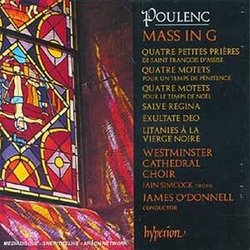| All Artists: Francis Poulenc, Iain Simcock Title: Poulenc: Mass in G; Quatre Petites Prières; Quatre Motets Members Wishing: 0 Total Copies: 0 Label: Hyperion UK Release Date: 4/5/1994 Album Type: Import Genre: Classical Style: Opera & Classical Vocal Number of Discs: 1 SwapaCD Credits: 1 Other Editions: Liszt: Soirées Musicales & Soirées Italiennes UPC: 034571166643 |
Search - Francis Poulenc, Iain Simcock :: Poulenc: Mass in G; Quatre Petites Prières; Quatre Motets
 | Francis Poulenc, Iain Simcock Poulenc: Mass in G; Quatre Petites Prières; Quatre Motets Genre: Classical
|
Larger Image |
CD Details |
CD ReviewsA very different interpretation... Mark Swinton | 07/15/1999 (4 out of 5 stars) "This recording of the Mass in G is harsh, unforgiving, difficult to listen to, and at times extremely ugly-- just the way M. Poulenc must have intended it. It also has points of majesty and glory which stand with the best of choral music. Here, as in no other recording I have heard, the duality is extreme and breathtaking. The British choral style, with its loud boys and near-absence of vibrato, cuts right to the heart of the Mass, in all its splendor. The best instance is to be found in the high B's in the "Hosanna" of the Sanctus and Benedictus: in Robert Shaw's recording, they are barely audible; here they are earth-rending and soul-piercing cries of Easter's joy or Good Friday's pain. The Agnus Dei soloist was surely the one Poulenc imagined as he composed it: absolute perfection. The intense harmonies of the motets, however, suffer slightly from excess of soprano. Most of us have grown accustomed to even blend of voices on these works, myself included. But once safety and security creep into Poulenc, the music is dead. This recording will rattle you; and well it should. As a great man once said, once we stop questioning what we believe, faith has left us. The song to the Black Virgin is among the strangest things I have ever heard, and it was new to me. Poulenc has always stood apart from the French organ composers (Durufle, Dupre, Vierne, Widor, Tournemire, etc.) in my mind, but in this instance, he shows great awareness of the organ's capabilities, if not of its virtuosic ones."
|

 Track Listings (20) - Disc #1
Track Listings (20) - Disc #1